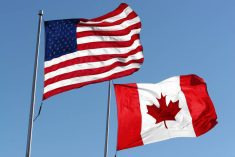On Sept. 9, Canada took the first step of challenging China’s ban on canola seed imports by sending a formal letter to the World Trade Organization.
The request for consultations with China may evolve in to a full-fledged case at the WTO. After a few years, Canada might win the case and have the right to retaliate with tariffs on Chinese goods, perhaps import tariffs on electronics and clothing from China.
But would that be a real victory for Canada?
“We could win the case and then impose retaliatory tariffs, which would hurt Canadian consumers, and not actually change the (Chinese) policy…. If China is going to change its policy, I don’t think it’s because they fear economic damages … from Canadian import tariffs,” said Ryan Cardwell, an agricultural economist at the University of Manitoba.
Read Also

Farming Smarter receives financial boost from Alberta government for potato research
Farming Smarter near Lethbridge got a boost to its research equipment, thanks to the Alberta government’s increase in funding for research associations.
“Consumers … could be worse off because the price of (an) iPhone and a shirt could go up.”
Cardwell, who studies international trade policy, explained during a Keystone Agricultural Producers meeting held late October in Brandon how a WTO dispute between Canada and China could potentially play out.
In March, China suspended canola seed imports from Richardson International and Viterra, claiming that Chinese inspectors detected”pests” in canola shipments.
That’s the official reason for the ban, but many believe China is punishing Canada for the detention of Meng Wanzhou, an executive with Huawei, a Chinese telecommunications firm. The United States is trying to extradite her to America, where she will face charges of violating international sanctions on Iran.
A couple of producers at the KAP meeting said Canada should send Meng back to China or to ship her to America, which should end the canola ban.
That’s possible, but China’s quarrel with “pests” in Canadian canola might not go away, Cardwell said.
The ban could persist, and the WTO case may proceed.
If that happens, the dispute will likely boil down to the sanitary and phytosanitary measures (SPS) agreement within the WTO.
“Countries in the WTO are allowed to impose regulations and trade barriers to protect domestic plant and animal and consumer safety,” Cardwell said.
Countries often abuse the SPS rules to protect domestic industries. For instance, the U.S. might heighten inspections of Mexican tomatoes because American tomato growers don’t want competition.
Cardwell believes the dispute with China will focus on blackleg — a soil-borne disease that affects canola.
China’s government says the virulent form of blackleg, found in Western Canada and elsewhere, isn’t present on Chinese farms that grow rapeseed. Dockage, plant tissue and soil material in canola seed shipments could contain blackleg spores. Therefore, Chinese officials could argue the ban on Canadian canola seed is necessary to prevent the spread of blackleg into China.
The WTO rules, however, say SPS measures must be based in science.
“China’s measures relating to the importation of Canadian canola seed appear to be inconsistent with China’s obligations under the WTO Agreement,” says Canada’s letter to the WTO, asking for consultations with China.
Canada’s case will probably hinge on a couple of sections of the SPS agreement, Cardwell said:
•Article 2.2, 2.3 state that SPS measures must be based on scientific principles and cannot be maintained without sufficient scientific evidence.
•Article 5.6, 6 say such measures must be “the least restrictive necessary” to achieve the desired goal.
A ban on canola seed imports is the most extreme action and the opposite of the “least restrictive” measure, Cardwell said.
It could take years, and involve many appeals, but Canada could win the case, and the WTO could order China to compensate Canada.
“I’m not going to get into how the compensation works because it never happens,” Cardwell told KAP members in Brandon.
Instead, the WTO will allow Canada to retaliate, equal to the value of China’s measures.
That’s what happened in the case of country-of-origin labeling. The WTO decided that U.S. COOL regulations for meat did not comply with international trading rules, so Canada and Mexico were permitted to retaliate.
The U.S. dropped COOL, after a seven year WTO process, but it’s unclear if China would back down on canola.
What is clear, at least to Cardwell, is that retaliatory tariffs will not work.
“The point of retaliation is to impose costs on the other country,” he said . “It’s really hard to imagine Canadian import tariffs on anything from China that would sway the position of the central government in China.”
If the WTO outcome is a victory and permission for Canada to retaliate, what’s the point if it doesn’t change China’s position on canola imports?
Such an outcome isn’t ideal, but Canada is a small country and needs a viable and relevant WTO.
“Is it worth it?” Cardwell asked. “If people are interested in maintenance of a rules-based trading system, then yes.”
Contact robert.arnason@producer.com


















